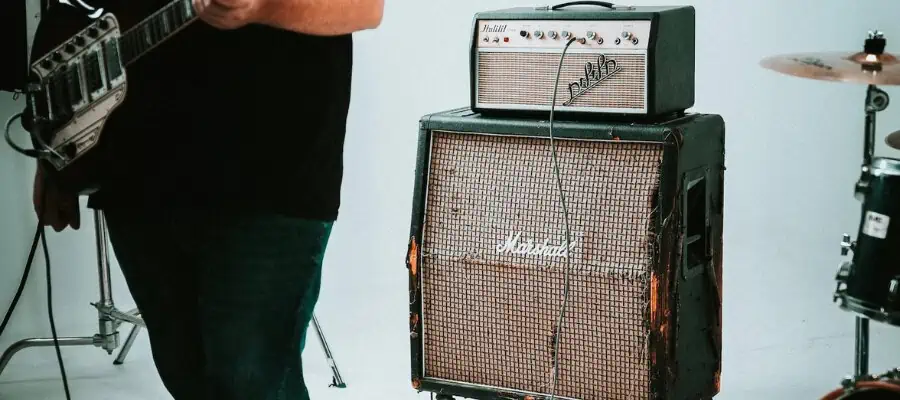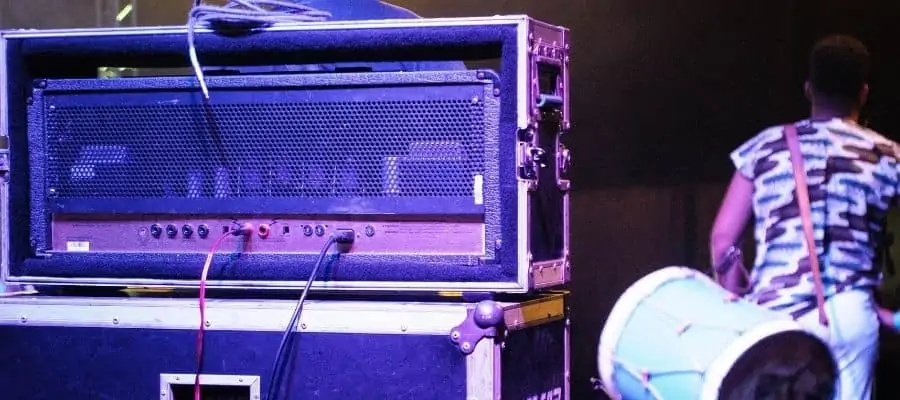Though a full guitar setup can drastically impact your sound and overall playing experience, it also requires a thorough maintenance routine. Part of that includes ensuring that every electrical component is safe and well looked after. While guitar amps are already known to suffer from technical issues, is it actually possible for them to catch fire or explode?
Guitar amps can catch fire and explode, though that’s rare. The risk level one undertakes when adding an amplifier to their setup depends on factors such as usage method, amplifier quality, and state of electrical connections.
If you want to learn more about the instances in which amplifiers are more prone to overheating and, thus, a fire hazard, read on. Below, I’ll also cover some tips on preventing an amp from overheating; that way, your session can be both productive and safe.
When Can a Guitar Amp Catch Fire or Explode?

Since most amplifiers are built to be used for hours without suffering any technical issues, these devices can handle quite a bit of heat. Still, there might come a time when there’s such a buildup of heat or sparks that the amp will quickly overheat.
When you combine that with poor ventilation and flammable materials somewhere in the vicinity, you can get an explosion followed by a fire. Luckily, this phenomenon is rare, and there are only a handful of potential causes, so let’s explore them individually.
Improper Use
Since most amplifiers must undergo strict quality screenings before they hit the market, it’s safe to assume that improper use is the leading cause behind their explosions.
Many musicians, especially less experienced ones, make careless mistakes when installing/using their amplifiers. These include (but are not limited to) plugging the device into the wrong power source, using damaged cables, or using incompatible connections.
Using the device well beyond its recommended time is another common mistake leading to overheating. When you first get an amplifier, reading the instructions manual is necessary, even if you’ve used another brand or model before.
There, you should find a recommended time on how long you should be able to use the device without taking any breaks. Make sure to follow that suggestion to a tee – better yet, try to stop at least an hour or two shy of it.
This tip is especially important if you practice in a small, poorly ventilated space – these circumstances can quickly turn a simple overheating situation into a full-blown fire.
Electrical Faults
The wiring inside the amplifier is bound to weaken as time passes, especially with frequent use. You may even start noticing loose connections and electrical problems; if you do, never ignore them.
Once you notice the slightest sign of an electrical issue, you’ll want to take your amp to be looked at by a professional. Though that may seem overkill, it can save your equipment, practice space, and even your life.
Degraded Components
Even if the wiring itself is in excellent shape, if one of the components that operate through it gets damaged, it can lead to a short circuit, creating heat and sparks. That’s why it’s a good idea to have your amp serviced by a qualified technician regularly, even if you don’t notice anything particularly worrying.
Even some of the most destructive issues can be undetectable to the inexperienced eye, so even though it can be a nuisance, please try to get your amp looked at least twice a year.
With all that said, I want to take this opportunity to differentiate between these real, dangerous scenarios that can contribute to an amplifier catching on fire and some myths that players and enthusiasts like to throw around just because.
For example, you might’ve heard that a low-quality guitar can cause an amp to explode – that’s not true. It’s impossible for a guitar to overload an amplifier, so if the latter catches on fire during a performance, chances are one of the above causes is to blame.
The good news is that most fires of this nature can be spotted and taken care of pretty easily. This means you might even be able to rescue your amp altogether if you act swiftly enough. However, if the fire is extensive enough to damage several components, it can be problematic. That’s why taking some steps to prevent it from igniting in the first place is your best bet.
How To Prevent a Guitar Amp From Overheating

Here are some of my top tips on how you can prevent a guitar amp from overheating:
- Clean it regularly – debris can impede airflow and cause the inner components to overheat.
- Always read the manufacturer’s manual and follow it to a tee.
- Use the correct power source.
- Use the right cables.
- Avoid using the amp for extended periods – if need be, take short breaks to split your session into smaller increments.
- Get the amplifier serviced by a qualified technician at least once every six months.
Lastly, I want to note that keeping the surrounding space open and well-ventilated is just as important as everything else that’s been mentioned thus far. Moreover, remember not to let any flammable materials come in contact with your guitar setup.
As long as you follow these tips, you will significantly reduce the risk of a fire or explosion, but you’ll also help improve the amplifier’s overall performance and longevity.
Conclusion
Though most amplifiers are made of high-quality materials that can withstand extended use, it’s still possible for them to catch fire or explode. Improper use, degraded components, and electrical faults can all contribute to overheating and, in turn, the creation of dangerous sparks.
When a small, poorly ventilated space complements these, the possibility of an explosion increases significantly.
Luckily, if you follow the tips outlined above, you shouldn’t have anything to worry about. Still, it doesn’t hurt to keep an eye (and an ear) out for any potential issues.,
If you found this article useful, you may want to save this pin below to your Guitar board.

Recent Posts
When learning new songs have you noticed that some of the chord sequences sound really good? But when you tried to come up with your own chord sequence, or as we call it chord progression, you found...
Some guitarists insist on buying an expensive amplifier with their electric guitar. They assume that this is a must for every type of guitarist out there. However, in some situations, this isn’t...

